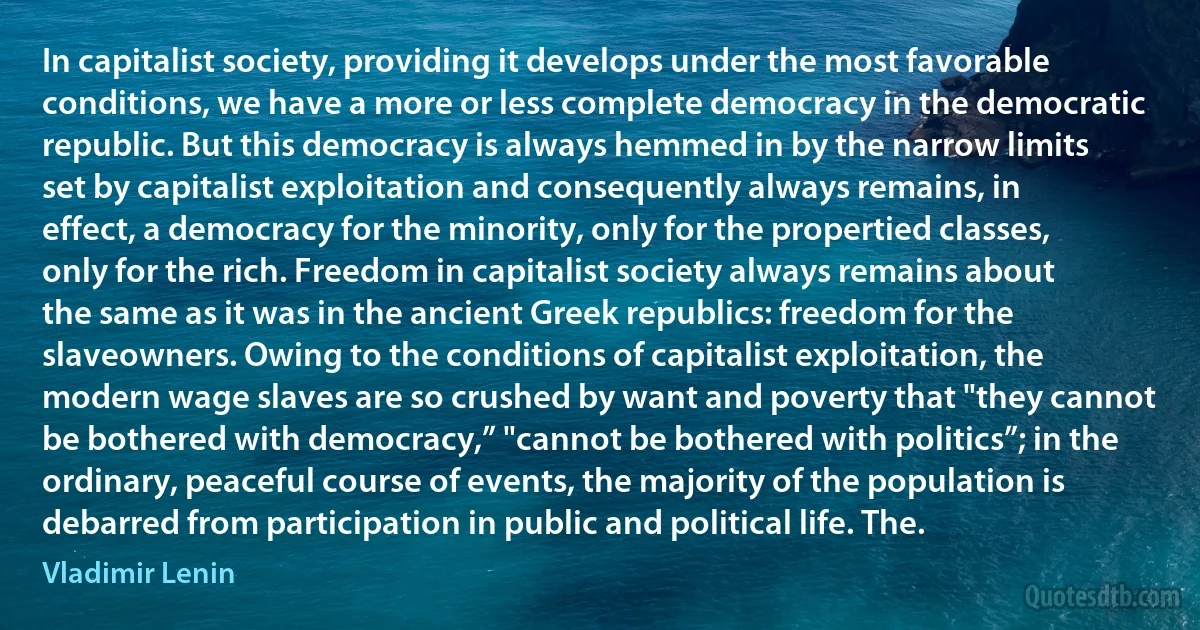
In capitalist society, providing it develops under the most favorable conditions, we have a more or less complete democracy in the democratic republic. But this democracy is always hemmed in by the narrow limits set by capitalist exploitation and consequently always remains, in effect, a democracy for the minority, only for the propertied classes, only for the rich. Freedom in capitalist society always remains about the same as it was in the ancient Greek republics: freedom for the slaveowners. Owing to the conditions of capitalist exploitation, the modern wage slaves are so crushed by want and poverty that "they cannot be bothered with democracy,” "cannot be bothered with politics”; in the ordinary, peaceful course of events, the majority of the population is debarred from participation in public and political life. The.
Vladimir LeninRelated topics
capitalist course democratic freedom less life narrow participation politics poverty public rich set under remainsRelated quotes
[T]o talk about socialism as a function of practical politics means gliding past its underlying appeal. After all, there are countless other ideologies that can be similarly reduced to the desire for power expressed by certain elites or certain segments of the aggrieved masses themselves. The most obvious example is, of course, nationalism, which has more in common with socialism than is ordinarily believed. From the French Jacobins to the Italian Fascists, nationalists tend to be in favor of state-directed economics, the redistribution of wealth, and a collectivist or communal organization of society. What unites all of these movements is a sense that liberal democratic capitalism doesn't provide a sense of social solidarity. It is too atomizing, too cut-throat, and mostly unconcerned with how we should all live together.

Jonah Goldberg
In my country at present, women have no participation in the higher levels of government and none whatsoever in the judiciary. Even within the democratic movement only 14 out of the 485 MPs elected in 1990 were women -- all from my own party, the National League for Democracy. These 14 women represent less than 3 percent of the total number of successful candidates. They, like their male colleagues, have not been permitted to take office since the outcome of those elections has been totally ignored. Yet the very high performance of women in our educational system and in the management of commercial enterprises proves their enormous potential to contribute to the betterment of society in general. Meanwhile our women have yet to achieve those fundamental rights of free expression, association and security of life denied also to their menfolk.

Aung San Suu Kyi
With Christian faith I pray that those who are today our adversaries may understand their error in time and may deeply reflect before persisting in a stance which is rejected by all the free peoples in the world and by all those who had their territory mutiliated and endured colonialism and exploitation. With Christian faith I pray for our men deployed to the southern seas, for your children, husbands, fathers, soldiers, NCOs and officers, who make up the front lines of an Argentine effort that will not stop until final victory is achieved. Invoking the protection of God and His Holy Mother, let us all commit ourselves to complying with our duty, as did the generations of the past century, who did not mind harsh weather, long distances, disease or poverty when it came to defending freedom.

Leopoldo Galtieri
For what advantage is it, that the world enjoys profound peace, if thou art at war with thyself? This then is the peace we should keep. If we have it, nothing from without will be able to harm us. And to this end the public peace contributes no little: whence it is said, ‘That we may lead a quiet and peaceable life.' But if any one is disturbed when there is quiet, he is a miserable creature. Seest thou that He speaks of this peace which I call the third (inner, ed.) kind? Therefore when he has said, ‘that we may lead a quiet and peaceable life,' he does not stop there, but adds ‘in all godliness and honesty.' But we cannot live in godliness and honesty, unless that peace be established. For when curious reasonings disturb our faith, what peace is there? or when spirits of uncleanness, what peace is there?

John Chrysostom
In a capitalist democracy there are essentially two methods by which social choices can be made: voting, typically used to make ‘political' decisions, and the market mechanism, typically used to make ‘economic' decisions. In the emerging democracies with mixed economic systems Great Britain, France, and Scandinavia, the same two modes of making social choices prevail, though more scope is given to the method of voting and to decisions based directly or indirectly on it and less to the rule of the price mechanism. Elsewhere in the world, and even in smaller social units within the democracies, the social decisions are sometimes made by single individuals or small groups and sometimes (more and more rarely in this modern world) by a widely encompassing set of traditional rules for making the social choice in any given situation, for example, a religious code.

Kenneth Arrow
